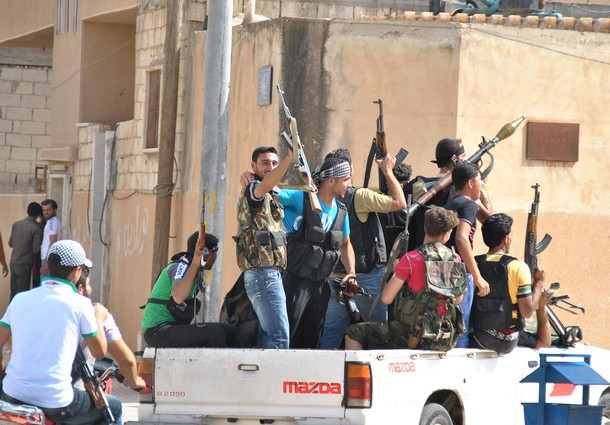Distracted by the tumult caused by the Syrian shoot down of a Turkish F 4, few observers have noted that the Syrian conflict has turned a corner. What I myself termed a “slow motion train wreck” of inexorable slaughter of civilians by government forces and militias just a couple of weeks ago has now shifted in pace and direction. The tempo of events is picking up, and the momentum is now primarily in the opposite direction–that is, at least for now, the rebels are winning.
Several indications over the past week show a changed atmosphere. Defections from the Syrian army have picked up in terms of number and rank of officers; while for now the impact on the military still loyal to the Assad regime might be primarily in terms of morale, it is starting to be possible to imagine that defections will at some point affect actual capabilities. The rebel soldiers (who are not all army defectors) now number some 40,000 according to a fascinating new report by Joseph Holliday of the Institute for the Study of War, and are “carving out de facto safe zones” around rebel strongholds including Homs, Hama, and Idlib. In addition, increased use of IEDs and the acquisition of heavy weapons by the rebels have allowed them to effectively counter the regime’s use of tanks and armored vehicles, a technical disadvantage that had served as an Achilles Heel of the Syrian revolution since the inception of armed conflict last year. Rebels have also demonstrated increased reach and a capability to strike deep within regime territory, shown through a number of operations carried out in recent days in the capital city of Damascus, long immune from all but marginal protests.
If such evidence of the increased strength of the rebels was not enough, President Bashar al-Assad’s June 27 remarks to his new cabinet supplied more. “When one is in a state of war,” he said, “all our policies and capabilities must be used to secure victory.” Translation: we are losing. This was significantly different from his previous remarks, in which al-Assad described the conflict as a matter of terrorists who would easily be defeated in time.
The fact that the rebels might be winning now, however, does not mean that they necessarily will be victorious, that they can win without being bolstered by outside military intervention (such as a no-fly zone), or that they are becoming more unified either military or politically. While the rebels have improved coordination and organization, on the ground factions maintain significant levels of autonomy and continue to operate completely independently from the upper echelons of the Free Syria Army. It certainly does not mean that a clear vision for a post-Assad Syria has emerged.
What it does mean, however, is that all the political wrangling of the last months—persuading the Russians, the Annan plan, the Yemen solution, the Syria friends group or contact group or action group—could possibly be overtaken by events on the ground in Syria, quickly, and with a highly unpredictable outcome. So buckle your seatbelts; it’s going to be a rough ride.
Michele Dunne is the director of the Atlantic Council’s Rafik Hariri Center for the Middle East.
Image: syrian%20rebels_1.jpg
